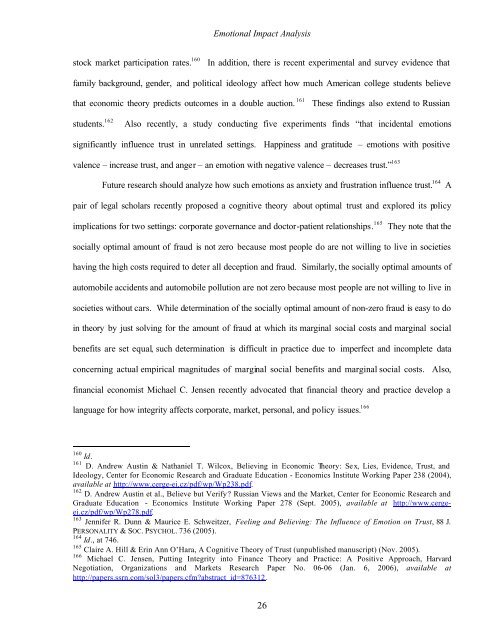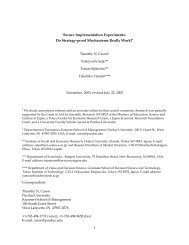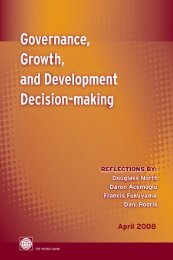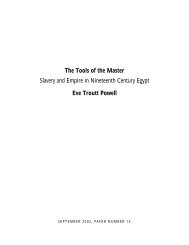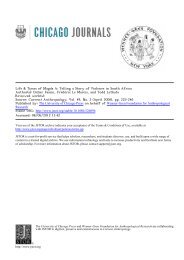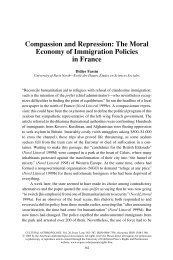Peter H. Huang Harold E. Kohn Chair Professor of Law James ...
Peter H. Huang Harold E. Kohn Chair Professor of Law James ...
Peter H. Huang Harold E. Kohn Chair Professor of Law James ...
You also want an ePaper? Increase the reach of your titles
YUMPU automatically turns print PDFs into web optimized ePapers that Google loves.
Emotional Impact Analysis<br />
stock market participation rates. 160 In addition, there is recent experimental and survey evidence that<br />
family background, gender, and political ideology affect how much American college students believe<br />
that economic theory predicts outcomes in a double auction. 161 These findings also extend to Russian<br />
students. 162 Also recently, a study conducting five experiments finds “that incidental emotions<br />
significantly influence trust in unrelated settings. Happiness and gratitude – emotions with positive<br />
valence – increase trust, and anger – an emotion with negative valence – decreases trust.” 163<br />
Future research should analyze how such emotions as anxiety and frustration influence trust. 164 A<br />
pair <strong>of</strong> legal scholars recently proposed a cognitive theory about optimal trust and explored its policy<br />
implications for two settings: corporate governance and doctor-patient relationships. 165 They note that the<br />
socially optimal amount <strong>of</strong> fraud is not zero because most people do are not willing to live in societies<br />
having the high costs required to deter all deception and fraud. Similarly, the socially optimal amounts <strong>of</strong><br />
automobile accidents and automobile pollution are not zero because most people are not willing to live in<br />
societies without cars. While determination <strong>of</strong> the socially optimal amount <strong>of</strong> non-zero fraud is easy to do<br />
in theory by just solving for the amount <strong>of</strong> fraud at which its marginal social costs and marginal social<br />
benefits are set equal, such determination is difficult in practice due to imperfect and incomplete data<br />
concerning actual empirical magnitudes <strong>of</strong> marginal social benefits and marginal social costs. Also,<br />
financial economist Michael C. Jensen recently advocated that financial theory and practice develop a<br />
language for how integrity affects corporate, market, personal, and policy issues. 166<br />
160<br />
Id.<br />
161<br />
D. Andrew Austin & Nathaniel T. Wilcox, Believing in Economic Theory: Sex, Lies, Evidence, Trust, and<br />
Ideology, Center for Economic Research and Graduate Education - Economics Institute Working Paper 238 (2004),<br />
available at http://www.cerge-ei.cz/pdf/wp/Wp238.pdf.<br />
162<br />
D. Andrew Austin et al., Believe but Verify? Russian Views and the Market, Center for Economic Research and<br />
Graduate Education - Economics Institute Working Paper 278 (Sept. 2005), available at http://www.cergeei.cz/pdf/wp/Wp278.pdf.<br />
163<br />
Jennifer R. Dunn & Maurice E. Schweitzer, Feeling and Believing: The Influence <strong>of</strong> Emotion on Trust, 88 J.<br />
PERSONALITY & SOC. PSYCHOL. 736 (2005).<br />
164<br />
Id., at 746.<br />
165<br />
Claire A. Hill & Erin Ann O’Hara, A Cognitive Theory <strong>of</strong> Trust (unpublished manuscript) (Nov. 2005).<br />
166<br />
Michael C. Jensen, Putting Integrity into Finance Theory and Practice: A Positive Approach, Harvard<br />
Negotiation, Organizations and Markets Research Paper No. 06-06 (Jan. 6, 2006), available at<br />
http://papers.ssrn.com/sol3/papers.cfm?abstract_id=876312.<br />
26


